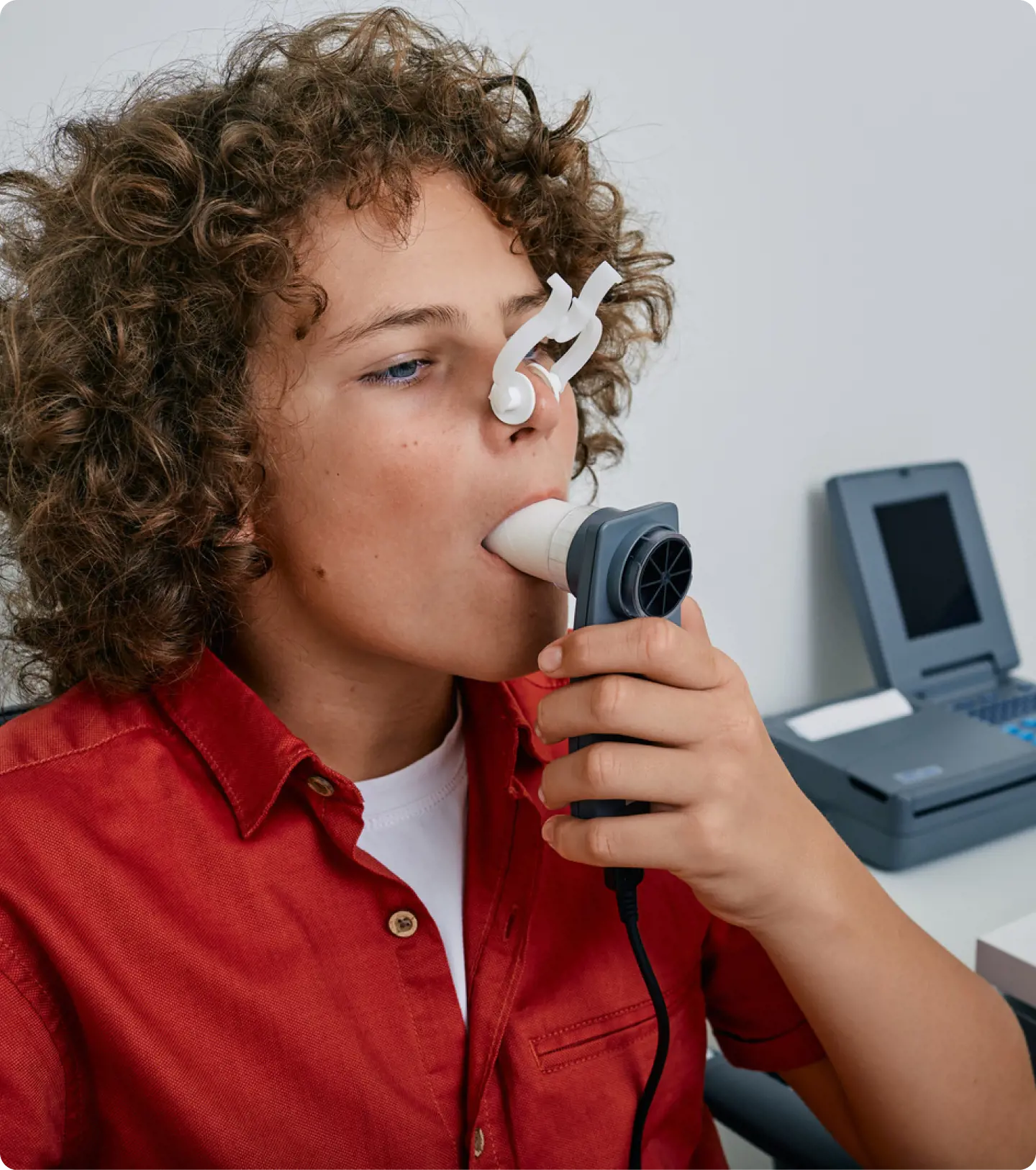Understanding the Different Types of Asthma
Asthma comes in many different types.
Some people rarely have asthma symptoms and only need to use medication occasionally. Your doctor might refer to this as “mild” asthma. On the other hand, some people with “severe” asthma have had life threatening asthma attacks and need to be on multiple medications to keep their asthma under control.
You might notice that your asthma symptoms only come on at certain times, or in particular situations, such as the workplace. In other cases, asthma might have a clear trigger, such as tobacco smoke, or pollen. For some people, medications such as aspirin or ibuprofen can also be an asthma trigger.
Asthma can start at different times of life – childhood or in adulthood. There are types of asthma that tend to occur at nighttime, or early in the morning. The time of year can also be important, with some people having their asthma worsen during particular seasons, such as spring time.
In some cases, identifying the type of inflammation (a reaction of your body’s immune system) in asthma can help you work out the best treatment approach.
Importantly, people can have a mix of different asthma types.
While you should always have asthma medication and an up-to-date asthma action plan, using additional strategies for your type of asthma ensures you are receiving the best treatment possible.
To manage asthma effectively, here are a few practical tips:
-
See your GP to confirm which asthma types you have and identify and avoid triggers whenever possible.
-
Regularly monitor your symptoms and use a peak flow meter (or ask your GP about spirometry) to track lung function.
-
Discuss with your GP about the best medications and inhalers for your specific type of asthma.
-
Create an asthma action plan in consultation with your GP.
-
Some asthma types are best managed with the help of a specialist allergist, lung doctor or paediatrician
Different Types of Asthma
Allergic (Extrinsic) Asthma
Usually starting in childhood or adolescence, this is the most common type of asthma, with around 80% of people with asthma having positive allergy test results. Common triggers include:
-
Pollen
-
Dust mites
-
Pet Dander
-
Mould
-
Insect Stings
If you also have conditions like hay fever or eczema, you may be more likely to experience allergic asthma. In addition to having asthma medication and an asthma action plan, you should discuss with your GP about additional strategies such as:
-
Avoiding exposure to known allergens
-
Reducing dust mite exposure
-
Keep your home clean
-
Wear a mask when outdoors during peak pollen seasons
-
Ask your GP about allergy testing or a referral to an allergist
-
Consider immunotherapy (allergy shots) if recommended by your doctor
Non-allergic Asthma
Usually starting in adulthood, non-allergic asthma (also known as non-atopic or intrinsic asthma) accounts for about 10-20% of all asthma cases. Common triggers include:
-
Tobacco smoke
-
Pollution
-
Strong odors
-
Stress
-
Viral respiratory tract infections
-
Exercise
Identifying the triggers for non-allergic asthma is crucial for prevention of asthma symptoms.
Exercise-Induced Asthma
Many people with asthma can have their symptoms triggered by physical activity – this is known as exercise-induced bronchospasm (EIB). Interestingly, symptoms are typically worst 5-10 minutes after stopping exercise, not during exercise. Allergic asthma triggers (such as pollen in a grassy soccer field) or non-allergic asthma triggers (like cold air during a winter’s evening netball training session) can make exercise-induced asthma more likely.
Strategies for managing exercise-induced asthma include:
-
Using bronchodilator asthma medication before exercise
-
Consider using preventer medication if symptoms occur frequently with exercise
-
Warming up before exercise (such as short sprints separated by short breaks)
-
Maintaining your fitness and exercising regularly
Many other health conditions can look like EIB. Your GP can help ensure you have the correct diagnosis and right medication, as well as the optimal warm up routine and asthma action plan to reduce how asthma affects your exercise.
Occupational Asthma
Around 1 in 5 people with asthma will be affected by work-related asthma. Exposure to specific substances at the workplace triggers asthma symptoms. Triggers can include:
-
Chemicals (such as isocyanates or solvents in paints)
-
Latex gloves
-
Wood dust
-
Flour
-
Laboratory animals
Prevention tips:
-
Wear protective gear, such as masks or non-latex gloves, when handling potentially hazardous substances
-
Avoid known asthma triggers wherever possible
-
Follow proper safety protocols and guidelines in the workplace
-
Take regular breaks to rest and recover from exposure to triggers
Occupational asthma may only become apparent in adulthood and is underdiagnosed. If you notice asthma symptoms that worsen at work, make an appointment with your GP as ongoing exposure may worsen asthma without optimal treatment,
Thunderstorm Asthma
Thunderstorm asthma occurs when the atmospheric conditions that cause thunderstorms, such as sudden wind pattern changes and high humidity, trigger an asthma attack in susceptible individuals. This phenomenon is often associated with the release of pollen from grasses and weeds during storms.
Seasonal Asthma
A type of asthma that occurs at certain times of the year, typically triggered by changes in temperature, humidity, or pollen levels. The most common seasons for seasonal asthma are spring and autumn, when grass and tree pollen are released into the air.
Prevention Tips:
-
Monitor pollen counts (tools such as Pollen Forecast can be helpful) and plan activities accordingly
-
Use a peak flow meter or ask your GP about spirometry to track lung function
-
Keep medication on hand, such as inhalers and bronchodilators and follow your asthma action plan
-
Consider consulting an allergist or GP
Nocturnal Asthma
Also known as nighttime asthma, this is a type of asthma that worsens during sleep, disrupting sleep quality. Nocturnal asthma can be triggered by various factors, including allergens such as dust mites or mould, or changes in temperature, and humidity.
Discussion with your GP about possible prevention measures include:
-
Dust mite reduction measures
-
Controlling humidity levels in your bedroom
-
Avoiding allergens and irritants that may trigger symptoms
-
Taking medication as prescribed by your doctor and ensuring your asthma action plan is up to date
Cough-Variant Asthma
A type of asthma characterised by persistent coughing without other asthma symptoms like wheezing or shortness of breath. It's often misdiagnosed as a chronic cough or gastroesophageal reflux disease (GERD). Cough-variant asthma affects approximately 10-20% of people with asthma.
Your GP can help you work out whether an ongoing cough is due to cough-variant asthma. Spirometry testing can be useful in these cases.
Aspirin-Exacerbated Respiratory Disease (AERD)
This type of asthma usually starts in adulthood and is triggered by the use of aspirin and other nonsteroidal anti-inflammatory drugs (NSAIDs) such as ibuprofen. People with AERD also have nasal polyps and live with chronic sinusitis.
Prevention tips:
-
Strictly avoiding aspirin and NSAIDs (such as ibuprofen) altogether
-
Using alternative pain relief medications, such as paracetamol
-
Make sure you use your asthma medication as prescribed and have an updated asthma action plan
Your GP can refer you to the right specialist to confirm the diagnosis and consider more advanced treatments such as immunotherapy.
Childhood Asthma
Asthma starting in childhood is often allergic asthma, but there can be non-allergic triggers as well. There may be relatives with asthma or related conditions like hay fever or eczema, so genetics likely play a role.
Children 6 years old and older may be recommended spirometry lung testing at the GP to help confirm childhood asthma diagnosis.
All children with asthma should:
-
Have an up-to-date asthma action plan with their GP – this is especially important for children at school and daycare
-
Have asthma medication for home and school
-
See their GP to assess for triggers for asthma and avoid these triggers where possible
Importantly, asthma is difficult to diagnose in children aged 1-5 years old and might be labelled as “preschool wheeze”. Asthma is even less likely in babies less than 12 months old. Your GP may advise that asthma symptoms in these age groups be looked at by a specialist paediatrician or paediatric lung doctor.
Adult-onset Asthma
Asthma can start in adulthood. While most of this is likely diagnosed in young adulthood, asthma can also start in middle age and the elderly.
Your GP can help diagnose adult-onset asthma, work out the triggers, and ensure you using the right asthma treatment and asthma action plan.
Different Types of Asthma Severity and Persistence
Your GP or lung specialist might describe your asthma based on how bad it is (severity) and how often (persistence) symptoms arise.
Examples of severity types include:
-
Mild: Symptoms are mild and infrequent, occurring less than once a week
-
Moderate: Symptoms occur more frequently, between one to three times a week. Moderate asthma may need more frequent medication use and adjustments to daily activities.
-
Severe: Symptoms are persistent and occur daily or almost daily, affecting sleep and important activities like work or study. This requires aggressive treatment with multiple medications as well as lifestyle modifications.
-
Very Severe: Symptoms can be life-threatening and challenging to manage despite standard asthma medications. This type of asthma needs involvement of a specialist lung doctor
Examples of persistence types include:
-
Intermittent: Symptoms occur from time to time but you generally feel well between episodes
-
Persistent: Symptoms are usually present over a prolonged period of time
Asthma might therefore be described as “mild intermittent asthma” or “persistent moderate asthma”.
What Role Does Inflammation Play in Different Types of Asthma?
Inflammation, a reaction caused by your body’s immune system, plays a crucial role in asthma, leading to airway swelling, mucus buildup, and increased sensitivity to triggers.
Different types of asthma are linked to specific forms of inflammation:
-
Eosinophilic inflammation: Common in allergic-asthma, involving high levels of eosinophils (a type of cell in your blood)
-
Neutrophilic inflammation: Seen in non-allergic-asthma, neutrophils (a different type of blood cell) contribute to persistent airway inflammation
-
Mixed inflammation: A combination of eosinophilic and neutrophilic inflammation
Asthma with neutrophilic inflammation might not respond as well to corticosteroid medication alone. On the other hand, eosinophilic inflammation asthma may benefit from treatment with targeted biologic therapies. Understanding inflammation types is useful in people with severe or persistent asthma, and seeing a specialist lung or allergy doctor is crucial in these situations.
When Should You See a Doctor?
In summary, there are many different types of asthma, and people can have a combination of different types. The types can even change over time. Understanding which type you have is important for optimal treatment.
If you have asthma that is not under control, or suspect you have asthma but it has not been diagnosed, it is essential to consult your GP, who can help:
-
Confirm the diagnosis and work out the type of asthma you have
-
Identify triggers for your asthma and strategies to reduce them
-
Arrange lung function (spirometry) and allergy testing
-
Prescribe the right medication
-
Optimise your asthma action plan
-
Refer you to any necessary specialists
References:
-
National Asthma Council Australia. (n.d.). National Asthma Council Australia. Retrieved February 27, 2025, from https://www.nationalasthma.org.au
-
Asthma Australia. (n.d.). Asthma Australia. Retrieved February 27, 2025, from https://asthma.org.au
-
Victorian Government. (n.d.). Better Health Channel - Asthma. Retrieved February 27, 2025, from https://www.betterhealth.vic.gov.au
-
Healthdirect Australia. (n.d.). Asthma. Retrieved February 27, 2025, from https://www.healthdirect.gov.au/asthma
-
Lung Foundation Australia. (n.d.). Lung Foundation Australia. Retrieved February 27, 2025, from https://lungfoundation.com.au
-
World Health Organization. (n.d.). Asthma. Retrieved February 27, 2025, from https://www.who.int/news-room/fact-sheets/detail/asthma
-
Global Initiative for Asthma. (n.d.). Global Initiative for Asthma (GINA). Retrieved February 27, 2025, from https://ginasthma.org’
-
ASCIA: Asthma and Allergy. Accessed March 13, 2025 from https://www.allergy.org.au/patients/asthma-and-allergy/about-asthma-and-allergy?highlight=WyJhc3RobWEiXQ==
-
Australian eTG. Asthma. Accessed March 13, 2025.
-
Australian Asthma Handbook. Accessed March 13, 2025.












